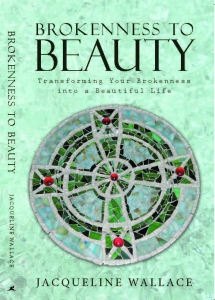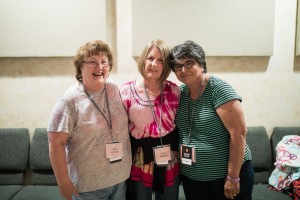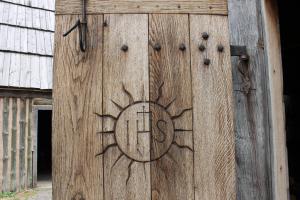I enjoy reading. I read books for improvement, for entertainment, and for relaxation. Years ago, I read the “Pendragon Cycle” by Stephen R. Lawhead, a series of four books based on the legend of King Arthur. Now, in case I’m about to lose you, hang in there. This is actually a very well-done story, and the author has several excellent spiritual truths woven into the story line. Let me tell you about one that I find both fascinating and instructive.
For generations the Britons had been fighting the invading barbarians and there was no peace. The Romans had come to Britain but now were gone, leaving the Brits to fend for themselves against the barbarians. It was an age of Darkness. Local kings had to raise warbands to defend their holdings and their people. They would set a High King over them who would join all the forces of the combined kings, the better to defend the country. They were a nation used to war and bloodshed, to mighty men of war.
In the third book of the series, “Arthur,” a battle is about to take place between hordes of barbarians holed up in an abandoned Roman fort, led by a traitorous British lord, and the warbands of Britain led by Arthur. His forces are woefully outnumbered by thousands of barbarians. Nonetheless Arthur and his warriors storm the high-sitting fort, its steep slopes strewn with thousands of large stones, a deadly way to have to do battle. The barbarians run down upon them, sheer numbers pushing the Britons back and allowing no advancement in the fight. Thousands are slaughtered but the Britons cannot take the wall of the fort. After the first day of battle Arthur’s men retreat to their camp to rest. Things are not going well, not at all.

The second day is the same. At noon they retreat to take a breather and the lords under Arthur meet with him to discuss strategy. Some want to lay siege to the fort and wait for more men. Arthur, as their leader and knowing better, is against it. Merlin approaches (in this retelling he is a former druid bard who is now a Christian, the Soul of Britain, their spiritual leader) and quietly says, “The hill is cursed. There is distress and calamity here. The slopes are treacherous with torment, and disaster reigns over all.” He goes on to recount the tragic history of treachery and betrayal and the battles fought there, and the spirit of evil which has been awakened by the treachery of the current traitorous lord leading the barbarians against his own countrymen.
The quieted lords, hanging on his words, ask what they are to do. Merlin answers, “This battle will not be won by stealth or might. It will not be won by bloodshed alone. The spirit abiding here will not be overthrown except by the power of God.”
The lords are thrown into a dither. They are used to fighting for their right, using force of physical strength to win their battles. The sword and bloodshed are what they are trained in. But trusting God? “What are we to do about that?” they cried.
“We must pray, Lords of Britain. We must erect a fortress of our own whose walls cannot be battered down or broken. A caer (fort) that cannot be conquered. A stronghold of prayer.”
Arthur heartily agrees to do this very thing. The next day before dawn, Merlin is seen climbing the hill of the fort and starts gathering rocks. Arthur goes to bring him back but ends up joining him in stacking stones. Other lords go up to stop what is going on and end up doing the same thing, and the warriors start flowing out to join them. A wall starts to take shape. When asked what they are doing, Arthur responds by lifting a stone over his head and calling to the men, “What do you see?” They call back “A stone!” “No!” Arthur shouts. “I tell you it is not a stone. It is something stronger than stone, and more enduring: it is a prayer!” He called them to look at all the stones on the steep hillside and see them as prayers. He was gathering the “prayers” to build a wall, a “stronghold to surround the enemy.”
This picture of prayer as a stronghold was given physical form as they built the wall which surrounded the whole hilltop fort. Within those walls they fought the enemy. They were trapped within the shoulder high wall as much as the enemy they fought.
This story of Arthur and his warbands is a make-believe story, one which likely never actually happened. But the author has penned a powerful truth and painted for us a fascinating picture of life as a follower of Jesus Christ. Can you see it?
An enemy has taken what is not his. He is more powerful than we are. We cannot defeat him by our efforts, though we lay down our lives to the last man. As hard as we work, as much as we give, it will not win the battle. We will wear out and finally give out if something doesn’t change. In the story, Arthur understood it, Merlin voiced it and gave critical insight and pointed wisely to the only solution: trust in the power of God, not the arm of flesh.
Now, you and I know we need to trust God in what we attempt in this life. If we are followers of Jesus Christ we have been called into the fight, which is made up of many battles, to advance the Kingdom of God, the rule of God on earth in the lives of people. No one will be forced against their will to enter the Kingdom of God. But we have an enemy that is adept at deceit, schooled and powerful in lies and deception. This enemy has deluded and blinded humankind, leaving men in darkness. We followers of Jesus are carriers of the Light and as such we have the responsibility to let that Light of truth shine forth so that all may see, and seeing, have the opportunity to leave the darkness and enter the Light.
Prayer to God and reliance on Him must be our first line of defense and attack. Then we must act. Our prayers are meaningless if we are not laying ourselves on the line to act, to do the right things to accomplish God’s goals. To be part of the answer to our own prayers.
On the one hand, we cannot win without faith in God. On the other hand, neither will we win a single battle unless we act, in faith and reliance on and obedience to the living God! These are not mutually exclusive realities. They go hand in hand. Faith without works is dead! Works without faith are powerless!
We must build that wall of prayer, that “stronghold” of prayer surrounding the enemy. Then our “sword swinging” will be effective. We will gain the high fort walls and defeat the enemy. And that’s no Arthurian fantasy.
Where I live there is much spiritual darkness, “there is distress and calamity here. The slopes are treacherous with torment, and disaster reigns over all.” The evil spirits in areas here are awake and busy at work. Do you see it where you live? It is there, make no mistake.
We as believers in Jesus Christ must be busy building that wall, that stronghold of prayer against the enemy who occupies the high ground. We cannot do this alone. Fellow believers must join together in lifting those heavy “stones” of prayer to assist in building that wall around the enemy.
We should also be busy “wielding the sword” of battle against the enemy forces, though we are far outnumbered, and fenced in by that very wall of prayer we have built. Our volunteering work with various Christian organizations, our churches as they reach into their communities, doing good in a multitude of ways, sending and supporting those whom God has called to carry the gospel to the ends of the earth; these are the “swords” wielded in battle! These are the physical exertions necessary to carry out the commands of Jesus Christ to demonstrate the gospel in our world.

Years ago, when we served God by serving the needy in West Virginia through Mustard Seeds and Mountains, Randy called me into his office to view a video just posted by a church group that had been there for a week doing home repair and Bible clubs. As I watched, I got choked up and began to cry. I was seeing the ministry of Mustard Seeds and Mountains through the eyes of the volunteers who are Mustard Seeds for that week, and I thanked God I was a part of it. Today, Randy and I serve with Mustard Seeds in different ways, predominantly teaching and training, and building a wall of prayer. And like we did in West Virginia, we are doing good things. We are doing the right things, wielding the sword of obedience and good works. I am so happy to be part of doing “something” for the Kingdom of God!
Let’s all encourage one another to keep on. Keep building that wall of prayer, keep wielding the sword … “to win for the Lamb the fruit of His suffering.”
This blog post was first seen on Jacque’s original blog, jacquesjourney.blogspot.com, published August 5, 2009. She now posts on Living with Hope and Purpose, the website of jacquelinegwallace.com. It is reposted here with minor edits and updates.
Photo of Fort by Chris Curry on Unsplash
Photo of Stone wall by Annie Spratt on Unsplash







